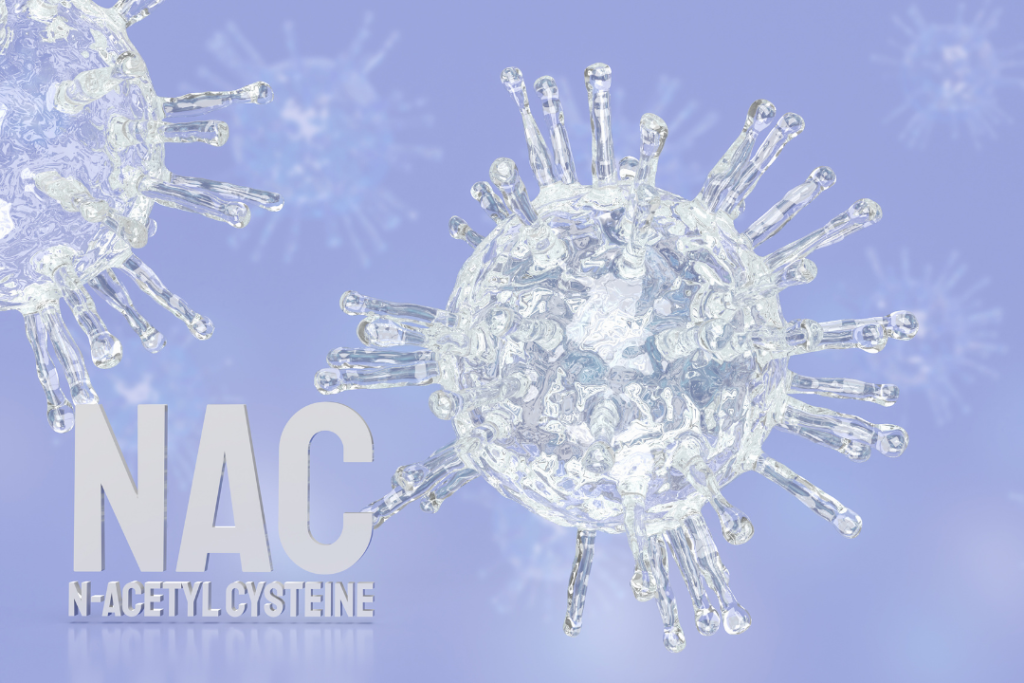Menu
The latest health tips, recipes and wellbeing inspiration from our team at The Remedy Room

N-Acetylcysteine (NAC) is a powerful antioxidant and precursor to glutathione, one of the body’s most important detoxifiers. Over the years, NAC has been the subject of numerous studies due to its wide range of potential health benefits. In this post, we’ll delve into NAC’s many uses, some key studies that provide robust scientific evidence into NAC’s health benefits, and some interesting information on how this amino acid is derived. Now, let’s get into the health benefits of NAC!
NAC’s mucolytic properties make it an effective agent in breaking down mucus and relieving sinus congestion. It works by disrupting the disulfide bonds in mucus, reducing its viscosity and facilitating its clearance from the airways.
A double-blind, placebo-controlled trial published in the Respiratory Medicine journal examined the effects of NAC on patients with chronic bronchitis. The study involved 169 participants who were randomly assigned to receive either NAC (400 mg three times daily) or a placebo for six months. The results demonstrated that the NAC group experienced significant improvements in mucus clearance and a reduction in the frequency of coughing compared to the placebo group.
Moreover, a study published in the American Journal of Rhinology & Allergy evaluated the efficacy of NAC in reducing symptoms of chronic rhinosinusitis. Participants who received NAC showed significant improvement in nasal congestion and overall sinus symptom scores compared to those who received a placebo.
NAC has been shown to improve respiratory function and alleviate symptoms in individuals with chronic respiratory conditions such as COPD. COPD is characterized by persistent respiratory symptoms and airflow limitation, often caused by significant exposure to noxious particles or gases.
A study published in the European Respiratory Journal conducted a double-blind, placebo-controlled trial involving 120 patients with stable COPD. The participants were randomly assigned to receive either NAC (600 mg twice daily) or a placebo for one year. The study found that the NAC group had a significant reduction in the number and severity of exacerbations compared to the placebo group. Additionally, lung function, measured by forced expiratory volume in one second (FEV1), was better maintained in the NAC group.
The antioxidative and mucolytic properties of NAC help reduce the viscosity of mucus, making it easier to expel, thereby improving breathing efficiency. This makes NAC an effective adjunct therapy for managing chronic respiratory conditions.
NAC has shown promise in improving mental health outcomes, particularly in cases of depression and anxiety. Its role in replenishing glutathione levels and reducing oxidative stress and neuroinflammation is believed to contribute to its positive effects on mental health.
A double-blind, placebo-controlled trial published in the Journal of Clinical Psychiatry evaluated the efficacy of NAC as an adjunctive treatment for major depressive disorder. In this study, 252 participants were randomly assigned to receive either NAC (2,000 mg per day) or a placebo for 12 weeks. The results demonstrated that those treated with NAC experienced a significant improvement in depressive symptoms compared to the placebo group, as measured by the Montgomery-Åsberg Depression Rating Scale (MADRS).
Another study, focusing on anxiety disorders, found that NAC supplementation led to significant reductions in anxiety symptoms. The antioxidative properties of NAC, along with its role in modulating glutamate and dopamine neurotransmission, likely contribute to these mental health benefits.
NAC is well-known for its ability to protect the liver, particularly in cases of acetaminophen (paracetamol) overdose, which can cause severe liver damage. For this reason, it is also widely used in medical settings. It works by replenishing glutathione stores, detoxifying harmful substances, and reducing oxidative stress in the liver.
A double-blind, placebo-controlled study published in the Hepatology journal assessed the efficacy of NAC in patients with non-acetaminophen-induced acute liver failure. The study involved 173 participants who were randomly assigned to receive either NAC or a placebo. The results showed that NAC significantly improved transplant-free survival rates compared to the placebo group, particularly in patients with early-stage hepatic encephalopathy.
In addition to its use in acute settings, NAC has been studied for its potential to support liver health in chronic conditions such as non-alcoholic fatty liver disease (NAFLD). Its antioxidant properties help mitigate liver inflammation and fibrosis, contributing to overall liver function improvement.

What is NAC and where does it come from?
Now we’ve covered why NAC is so widely popular, but let’s talk a little bit about the interesting way of how NAC is derived. NAC is a modified form of the amino acid cysteine. The process of deriving NAC involves a series of chemical reactions that transform cysteine into its acetylated form. Cysteine can be derived from various sources, including animal proteins such as poultry feathers, hog hair, and human hair. This extraction involves hydrolysing the protein sources to release free amino acids, including cysteine. The free cysteine obtained is then chemically reacted with acetic anhydride or acetyl chloride. This reaction acetylates the cysteine, converting it into N-Acetylcysteine. The NAC produced is then purified to remove any impurities or by-products resulting from the synthesis process. This step is crucial to ensure that the final product is of high pharmaceutical or supplement-grade quality.
To create a vegetarian alternative, a similar chemical process occurs, however using non-animal sources. Vegetarian NAC is often derived from cysteine produced through microbial fermentation. Specific strains of bacteria, such as E. coli, can be genetically engineered to produce cysteine. This process involves fermenting plant-based substrates like glucose or other carbohydrates, which the bacteria use to produce cysteine. The cysteine produced by the bacteria is then isolated and purified. This step ensures that the cysteine is free from any microbial contaminants and other impurities. Similar to the traditional method, the isolated cysteine is chemically reacted with acetic anhydride or acetyl chloride to produce N-Acetylcysteine. The chemical reaction remains the same as above, and the final NAC product undergoes purification processes to ensure it meets quality standards suitable for use in supplements. At The Remedy Room, we stock both animal-derived NAC and vegetarian NAC products.
As you can see, NAC is a versatile supplement with a wide range of health benefits, to suit all walks of life. Its ability to support respiratory health, mental health, liver function, and mucolytic properties makes it a valuable addition to therapeutic regimens for various conditions.
As always, individuals should consult healthcare professionals before starting any new supplement regimen. Luckily, our Naturopaths and Clinical Nutritionists on The Remedy Room naturopathic dispensary are here to help you!
Follow the link HERE to our online store, where you can gain access to our NAC product range.
References:

Jessie Johns is a Clinical Nutritionist at The Remedy Room that has a deep understanding of how the food we eat impacts our health and wellbeing. She believes that consistently meeting the body’s nutritional requirements with adequate wholefoods is fundamental in not only restoring good health, but to truly heal the body and thrive.
To learn more about Jessie click here
The Remedy Room recognises the Bundjalung of Byron Bay Arakwal people, the Minjungbal people and the Widjabul people as Traditional Owners and custodians for parts of the Byron Shire